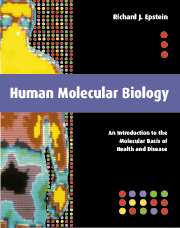Book contents
- Frontmatter
- Contents
- Preface
- Acknowledgements
- Read me first …
- Glossary
- Dedication
- Introduction: A disease for every gene?
- I From molecular biology to human genetics
- II From molecular genetics to human biochemistry
- III From molecular biochemistry to human cell biology
- IV From molecular cell biology to human physiology
- V From molecular physiology to human molecular biology
- Index
Preface
Published online by Cambridge University Press: 01 June 2011
- Frontmatter
- Contents
- Preface
- Acknowledgements
- Read me first …
- Glossary
- Dedication
- Introduction: A disease for every gene?
- I From molecular biology to human genetics
- II From molecular genetics to human biochemistry
- III From molecular biochemistry to human cell biology
- IV From molecular cell biology to human physiology
- V From molecular physiology to human molecular biology
- Index
Summary
Good health is a matter of having the right molecules in the right place at the right time. This may seem self-evident, but the idea that health is determined mainly by molecules has only gained acceptance in recent years.
Consider this in historical perspective. A century ago health was regarded as a function of body parts – if you had a regular bowel and a strong heart you were OK. This anatomic model of health was superseded in due course by models based on organ function, the so-called system-based (physiologic) approach. But physiologic systems are interdependent: you can't have an effective gastrointestinal system without a nervous system, or a competent immune system without a hemopoietic system, or a responsive cardiovascular system without an endocrine system. This limitation has so far prevented even the most integrated biomedical curricula from communicating a wholly holistic view of human biology.
A popular response to such difficulties has been the proposal that students of the twenty-first century should no longer be force-fed so much information. Facts have become unfashionable, an irrelevance to the higher goal of imbuing trainees with creative insights and self-learning potential. What is needed, many believe, is a way of transmitting broad scientific principles without the burden of detail.
- Type
- Chapter
- Information
- Human Molecular BiologyAn Introduction to the Molecular Basis of Health and Disease, pp. xxi - xxiiiPublisher: Cambridge University PressPrint publication year: 2002



